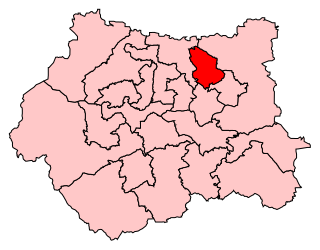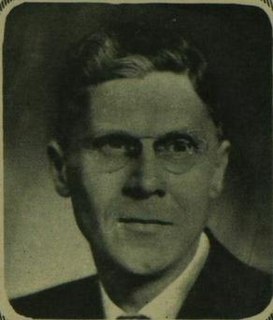
The Liberal Party was one of the two major political parties in the United Kingdom, along with the Conservative Party, in the 19th and early 20th centuries. Beginning as an alliance of Whigs, free trade–supporting Peelites and reformist Radicals in the 1850s, by the end of the 19th century it had formed four governments under William Gladstone. Despite being divided over the issue of Irish Home Rule, the party returned to government in 1905 and won a landslide victory in the 1906 general election.

Leeds North East is a constituency which has been represented in the House of Commons of the UK Parliament since 1997 by Fabian Hamilton of the Labour Party.
Wednesbury was a borough constituency in England's Black Country which returned one Member of Parliament (MP) to the House of Commons of the Parliament of the United Kingdom from 1868 until it was abolished for the February 1974 general election.
Finsbury East was a parliamentary constituency centred on the Finsbury district of North London, England. It returned one Member of Parliament (MP) to the House of Commons of the Parliament of the United Kingdom, elected by the first past the post system.

Donald William Wade, Baron Wade, DL was a British solicitor who became a Liberal Party Member of Parliament. Wade's time in Parliament coincided with the time the Liberals were at their lowest ebb but his job as Chief Whip kept the party operating until times were better; however, his own seat was dependent on a local pact with the Conservatives and when it broke down, he was defeated. He was then elevated to the House of Lords where he became an active Peer.
The 1904 Normanton by-election was held to elect a member to the Parliament of the United Kingdom.
1905 The Barkston Ash by-election was a parliamentary by-election held for the British House of Commons constituency of Barkston Ash, then in the West Riding of Yorkshire, on 13 October 1905.
The 1902 Bury by-election was a by-election held in England on 10 May 1902 for the House of Commons constituency of Bury in Lancashire.
The 1962 Stockton-on-Tees by-election was a parliamentary by-election held for the House of Commons constituency of Stockton-on-Tees in County Durham on 5 April 1962. It was the by-election at which Bill Rodgers, a future Cabinet minister and member of the "Gang of Four" of senior Labour politicians who defected to form the SDP, entered Parliament. Rodgers subsequently helped to lead the SDP into the merger that formed the Liberal Democrats, and later served as that party's leader in the House of Lords. In the circumstances it is not without irony that Rodgers remembers future Liberal leader David Steel, then not yet a Member of Parliament (MP), loudly booing the result of the election at Stockton from the floor of the count.
The 1902 Cleveland by-election was a parliamentary by-election held for the House of Commons constituency of Cleveland in the North Riding of Yorkshire on 5 November 1902.

Sir John Lawson Walton KC was a British barrister and Liberal politician.
The 1892 Leeds South by-election was a parliamentary by-election for the House of Commons constituency of Leeds South in the West Riding of Yorkshire held on 22 September 1892.
The 1908 Leeds South by-election was a parliamentary by-election for the House of Commons constituency of Leeds South in the West Riding of Yorkshire held on 13 February 1908.
The Chorley by-election was a Parliamentary by-election. It returned one Member of Parliament (MP) to the House of Commons of the United Kingdom, elected by the first past the post voting system. Although it was a safe Unionist seat which was held, the reduction in the Unionist majority was notable.
The 1902 Dewsbury by-election was a by-election held in England on 28 January 1902 for the House of Commons constituency of Dewsbury in the West Riding of Yorkshire.
The 1902 Liverpool East Toxteth by-election was held on 6 November 1902 after the resignation of the Conservative MP Augustus Frederick Warr. The seat was retained by the Conservative candidate Austin Taylor.
The 1944 Skipton by-election was a parliamentary by-election for the British House of Commons constituency of Skipton, Yorkshire held on 7 January 1944.
The 1902 Sevenoaks by-election was held on 21 August 1902 after the appointment of the incumbent Conservative MP Henry Forster as Lord Commissioner of the Treasury. The seat was retained by Forster.
The 1902 Clitheroe by-election was held on 1 August 1902 after the incumbent Liberal MP Sir Ughtred Kay-Shuttleworth was elevated to the House of Lords. The Labour Representation Committee candidate David Shackleton won the by-election unopposed.
The 1902 Devonport by-election was held on 22 October 1902 after the death of one of the incumbents, Liberal politician E. J. C. Morton. The contest was won by the Conservative Party candidate John Lockie.




